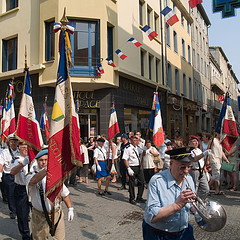On the fourteenth day of July in 1789 the gluttonous King Louis XVI was on the French throne, but not for much longer.
It was a time when there was terrible poverty among the masses and extreme extravagance among the nobility. Peasants generally lived on a diet of bread, soup and whatever fruits, berries and nuts that were in season in contrast to the luxurious feasts served up to the rich. So when bread became scarce, due to a number of reasons, and rose in price by 90%, the peasants quite rightly became a little miffed.
The crops had failed again and the ordinary man’s staple of bread had become in such short supply. And this was the time when their queen, Marie Antoinette rather thoughtlessly suggested well “let them eat cake”. The peasants had had enough of this two tier society and 80,000 of them stormed the prison of Bastille eventually leading to the overthrowing of the royal family and King Louis XVI to the guillotine.
Today the French celebrate these events with a national holiday of Bastille Day. There are parades and fireworks and picnics which of course include that revolution causing French bread. Over 70% of French people buy their bread fresh everyday with a split between the baguette and pain de campagne (country bread). French bread is rather like what we would call sourdough bread and made with a starter of flour and water. The starter eventually ferments with wild yeasts that are present in the atmosphere but it is an arduous process as it needs constantly refreshing.

French law dictates that no artificial additives are permitted in their bread and another strict law was brought about in 1998 stating that a ‘boulangerie’ or bakers sign may only be hung outside if they are ‘personally involved in the kneading of the dough, it’s fermentation and it’s shaping’. These days, most boulangeries also offer a range of breads spiced up with nuts (pain aux noix), olives, bacon (pain aux lardons), cheese and a variety of other natural additives.
The French famously enjoy nothing more than dunking their bread into coffee or hot chocolate but not on the fourteenth of July when the Bastille Day celebrations call for copious amounts of real Champagne to be served alongside that omnipresent baguette.
Photos courtesy of flickr - Rita Crane, Steveshriw, Adam Pieniazek